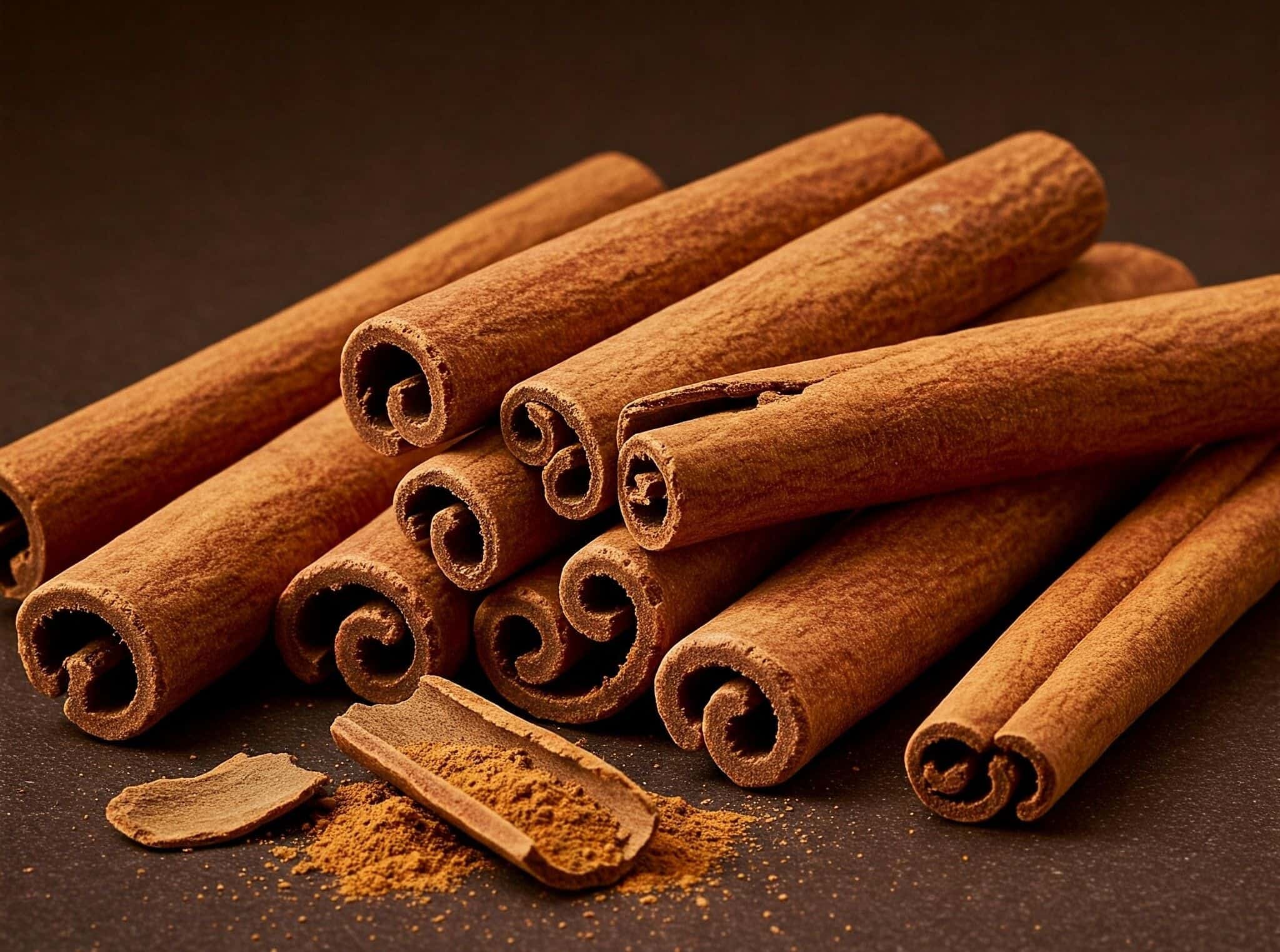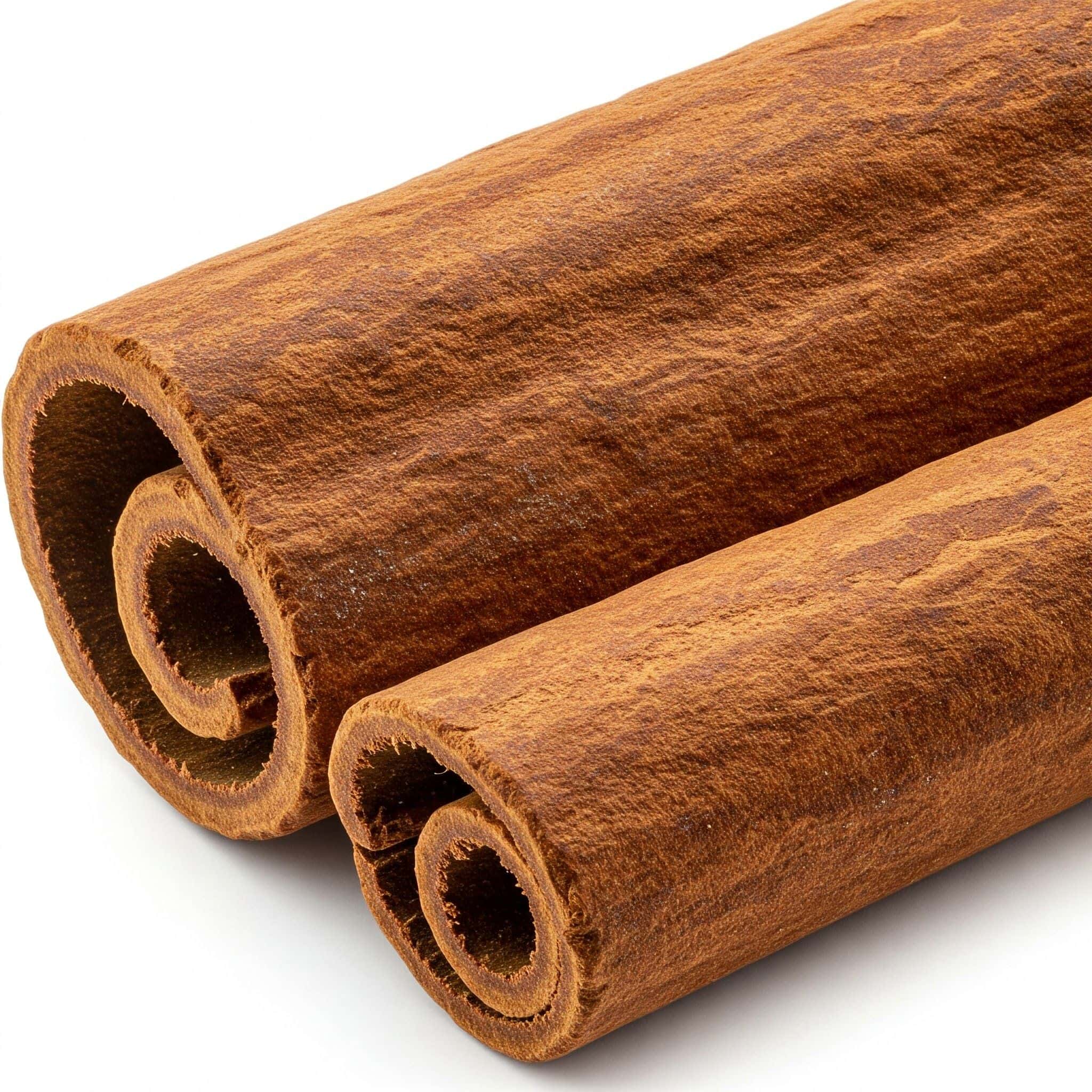Science-Backed Rituals for Hormonal Balance, Sleep and Mood. Free Shipping.

Cinnamon Bark Extract
Cinnamomum verum (True Cinnamon) , Cinnamomum cassia (Cassia Cinnamon)


Herb
Common Name
Cinnamon,
Cassia,
Ceylon Cinnamon,
Dalchini (Indian name)
Family
Lauraceae
Parts Used
Inner bark
Native To
Native to Sri Lanka (Ceylon cinnamon), India, and Southeast Asia. Cultivated widely in tropical regions.
Historical and Traditional Uses:
- Ancient Medicine: Used in Traditional Chinese Medicine (TCM) and Ayurveda to improve digestion, relieve cold symptoms, and enhance circulation.
- Culinary Use: Widely used as a spice for its flavor and aroma.
- Preservation: Known for its antimicrobial properties, used historically to preserve food.
- Folk Medicine: Applied as a remedy for respiratory and digestive issues, as well as for managing blood sugar.
Chemical Composition:
- Cinnamaldehyde: Responsible for its distinct flavor and major pharmacological effects.
- Eugenol: Found in higher amounts in Ceylon cinnamon.
- Polyphenols: Epicatechin, catechin, and procyanidins.
- Volatile Oils: Linalool, beta-caryophyllene.
- Coumarins: Present in higher amounts in Cassia cinnamon.
Pharmacological Properties:
- Antioxidant: Neutralizes free radicals and reduces oxidative stress.
- Antimicrobial: Effective against bacteria, fungi, and viruses.
- Anti-inflammatory: Reduces inflammation and supports chronic conditions.
- Hypoglycemic: Lowers blood sugar levels and enhances insulin sensitivity.
- Cardioprotective: Improves lipid profiles and circulation.
- Neuroprotective: Supports brain function and reduces age-related cognitive decline.
- Anti-cancer: Shows potential anti-proliferative activity in preliminary studies.
Evidence-Based Uses and Benefits:
1. Blood Sugar Control:
- Effect: Reduces fasting blood glucose levels and enhances insulin sensitivity.
- Key Study: A meta-analysis by Allen et al., 2013 confirmed the hypoglycemic effects of cinnamon
2. Cardiovascular Health:
- Mechanism: Reduces LDL cholesterol, triglycerides, and blood pressure.
- Study Reference: Ranasinghe et al., 2012 demonstrated improved lipid profiles
3. Weight Management:
- Effect: Boosts metabolism and may reduce appetite.
- Research Insight: Some studies suggest cinnamon supplementation supports weight loss efforts.
4. Antimicrobial Properties:
- Use: Effective against E. coli, Candida, and Staphylococcus aureus.
- Evidence: Documented in multiple studies for its broad-spectrum antimicrobial activity.
5. Neuroprotective Effects:
- Use: May reduce cognitive decline in neurodegenerative conditions.
- Study: Preclinical research suggests cinnamon compounds protect against Alzheimer’s disease.
6. Anti-inflammatory and Pain Relief:
- Mechanism: Reduces inflammation in joints and muscles, potentially aiding arthritis management.
- Evidence: Studies confirm anti-inflammatory effects in animal models and human trials.
Counter-Indications:
- Liver Disease: Avoid high doses of Cassia cinnamon due to its high coumarin content, which may cause hepatotoxicity.
- Pregnancy: May stimulate uterine contractions in high doses.
- Allergy: Individuals allergic to cinnamon or related plants should avoid use.
Side Effects:
- Mild gastrointestinal discomfort (e.g., nausea or bloating).
- Allergic reactions (skin rash or irritation in sensitive individuals).
- Risk of liver toxicity with excessive consumption of Cassia cinnamon.
Drug Interactions:
- Anticoagulants: May enhance the effects of blood-thinning medications (e.g., warfarin).
- Antidiabetic Drugs: Can potentiate blood sugar-lowering effects, requiring dose adjustments.
- Herbs and Supplements: Avoid combining with other hypoglycemic herbs (e.g., berberine, fenugreek) without medical advice.
Research and White Papers with Links:
- Blood Sugar Control: Cinnamon’s role in glycemic control
- Cardiovascular Benefits: Ranasinghe et al., Effect of cinnamon on lipid profiles
- Antimicrobial Activity: Review of cinnamon’s antimicrobial properties
Conclusion:
Cinnamon bark extract is a versatile and scientifically supported herbal remedy. It is widely recognized for its effects on blood sugar regulation, cardiovascular health, and antimicrobial activity. However, caution should be taken with the form and dosage, as Cassia cinnamon’s high coumarin content may pose risks in excessive amounts.
Tips, Updates & Stories
We respect your privacy. No spam, only wellness.
Tips, Updates & Stories
We respect your privacy. No spam, only wellness.
© 2026 Terrapy. All Rights Reserved.



